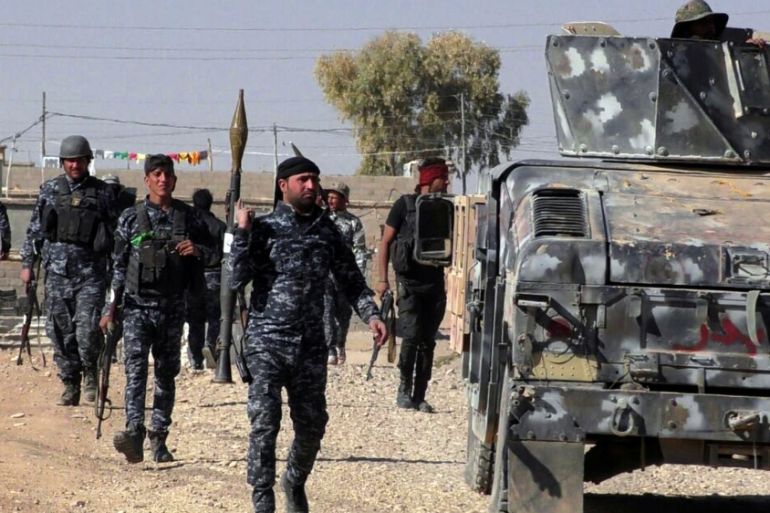Battle for Mosul: Investigators examine mass grave site
Several decapitated bodies found during initial examination of mass grave in Hammam al-Alil area near Mosul.

Iraqi investigators have carried out an initial examination on Tuesday of a mass grave site discovered in an area south of Mosul that was recently retaken from ISIL control.
Iraqi security forces announced the discovery of the site in the Hammam al-Alil area on Monday, after retaking it as part of the operation to recapture Mosul, the last Iraqi city held by the Islamic State of Iraq and the Levant group, also known as ISIS.
Keep reading
list of 4 itemsRussia-Ukraine war: List of key events, day 791
US top diplomat Blinken visits China amid escalated tensions over Taiwan
Why are nations racing to buy weapons?
“Today, the team conducted an initial examination,” said Mohammed Taher al-Tamimi, head of the operations room in the general secretariat of the cabinet, which he said is coordinating and supporting efforts to investigate the site.
Iraq’s Joint Operations Command said on Monday that 100 headless bodies had been found in the Hammam al-Alil area – an assertion that did not appear to be supported by available evidence on the ground.
“From what we saw today, I believe that there are around 25 bodies visible. But this does not mean that this is the total number. We believe that there are very large numbers there,” Tamimi said.
From what we saw today, I believe that there are around 25 bodies visible.
Men in Iraqi police uniforms used ropes to pull two bodies, one of them headless, from the grave, and also removed a decapitated head, but they were later told to return them to their original locations.
The investigators, some of whom wore face masks because of the smell, took notes at the grave site.
On Tuesday, the United Nations said that ISIL fighters have abducted 295 former Iraqi Security Forces members near Mosul and forced 1,500 families to retreat with them from the town of Hammam al-Alil towards Mosul airport.
“People forcibly moved or abducted, it appears, are either intended to be used as human shields or – depending on their perceived affiliations – killed,” UN human rights spokeswoman Ravina Shamdasani said.
The UN also had information about the abduction of at least 30 sheikhs in Sinjar last week, and one report that 18 of them had been killed on Friday.
ISIL overran large areas north and west of Baghdad in 2014, declaring a cross-border “caliphate” that also included territory in neighbouring Syria.
Its rule has been marked by repeated atrocities including mass beheadings and other executions that it has documented in photos and videos shared by its supporters online.
Iraqi forces have since regained much of the territory that ISIL seized, and have uncovered a series of mass graves and massacre sites as they have pushed the group back.
READ MORE: Peshmerga push into ISIL-held Bashiqa
Meanwhile, Iraqi Kurdish forces have exchanged heavy fire with ISIL fighters as they move from two directions into the centre of Bashiqa, a town along a key supply route for the armed group on the way to Mosul.
The offensive to reclaim the town 13km east of Mosul city is the latest push in a broader offensive to drive ISIL out of Iraq’s second-largest city.
Combat began at dawn on Monday with a Kurdish barrage of heavy artillery, Katyusha rockets, and mortar rounds striking ISIL positions, providing cover for the advance of armoured columns.
“Peshmerga fighters tell us they’ve retaken most of Bashiqa now,” Al Jazeera’s Mohammed Jamjoom reported from about 2.5km away.
He said troops had secured the municipal building in the centre of Bashiqa.
However, by late Monday, the battle still raged on.
“We’re still hearing heavy fighting going on: street battles, gunfire, there’s been air strikes happening as well. So it seems, at this hour, the fight is still intensifying,” our correspondent said.
Bashiqa is believed to be largely deserted except for dozens of ISIL fighters.
“We have the coordinates of their bases and tunnels, and we are targeting them from here in order to weaken them so that our forces can reach their targets more easily,” Peshmerga commander Brigadier-General Iskander Khalil Gardi told the Associated Press news agency.
